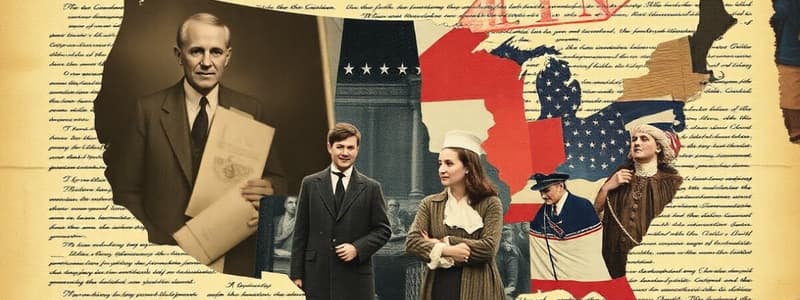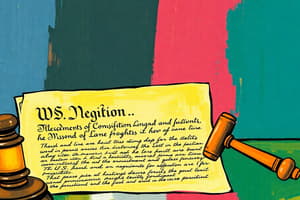Podcast
Questions and Answers
Which Amendment deals specifically with the process of electing the President and Vice President?
Which Amendment deals specifically with the process of electing the President and Vice President?
- Eighteenth Amendment
- Seventeenth Amendment
- Twelfth Amendment (correct)
- Twenty-Second Amendment
Which Amendment protects against unreasonable searches and seizures?
Which Amendment protects against unreasonable searches and seizures?
- First Amendment
- Fourth Amendment (correct)
- Sixth Amendment
- Fifth Amendment
Which Amendment guarantees the right to a speedy and public trial?
Which Amendment guarantees the right to a speedy and public trial?
- Eighth Amendment
- Fifth Amendment
- Sixth Amendment (correct)
- Seventh Amendment
Which Amendment granted citizenship to all people born in the United States and guaranteed equal protection under the law?
Which Amendment granted citizenship to all people born in the United States and guaranteed equal protection under the law?
Which of these amendments was replaced by another amendment?
Which of these amendments was replaced by another amendment?
Which Amendment prevents Congress from giving itself a pay raise until after the next election?
Which Amendment prevents Congress from giving itself a pay raise until after the next election?
Which Amendment abolished slavery?
Which Amendment abolished slavery?
Which of the following is NOT a right guaranteed by the Bill of Rights?
Which of the following is NOT a right guaranteed by the Bill of Rights?
Flashcards
First Amendment
First Amendment
Guarantees freedom of speech, religion, press, assembly, and petition.
Second Amendment
Second Amendment
Protects the right to bear arms.
Fourth Amendment
Fourth Amendment
Protects against unreasonable searches and seizures.
Fifth Amendment
Fifth Amendment
Signup and view all the flashcards
Thirteenth Amendment
Thirteenth Amendment
Signup and view all the flashcards
Nineteenth Amendment
Nineteenth Amendment
Signup and view all the flashcards
Twenty-Second Amendment
Twenty-Second Amendment
Signup and view all the flashcards
Articles of Confederation
Articles of Confederation
Signup and view all the flashcards
Study Notes
US Constitutional Amendments
- First Amendment: Freedom of speech, religion, press, assembly, and petition
- Second Amendment: Right to bear arms
- Third Amendment: Prevents forced quartering of soldiers
- Fourth Amendment: Protection against unreasonable searches and seizures
- Fifth Amendment: Right to remain silent, double jeopardy protection, due process
- Sixth Amendment: Right to a speedy and public trial
- Seventh Amendment: Right to a jury trial in certain civil cases
- Eighth Amendment: Protection against cruel and unusual punishment
- Ninth Amendment: People possess rights beyond those listed in the Constitution
- Tenth Amendment: Powers not given to the federal government belong to states or people
- Eleventh Amendment: Limits lawsuits against states
- Twelfth Amendment: Changed presidential and vice-presidential election process
- Thirteenth Amendment: Abolished slavery
- Fourteenth Amendment: Granted citizenship to all born in the US and guaranteed equal protection
- Fifteenth Amendment: Gave African American men the right to vote
- Sixteenth Amendment: Allowed Congress to collect income taxes
- Seventeenth Amendment: Allowed direct election of Senators
- Eighteenth Amendment: Banned alcohol (Prohibition)
- Nineteenth Amendment: Granted women the right to vote
- Twentieth Amendment: Changed the start date of the President's term to January 20th
- Twenty-First Amendment: Repealed the Eighteenth Amendment (ended Prohibition)
- Twenty-Second Amendment: Limited the President to two terms
- Twenty-Third Amendment: Gave Washington, D.C. three electoral votes
- Twenty-Fourth Amendment: Banned poll taxes
- Twenty-Fifth Amendment: Presidential succession explained
- Twenty-Sixth Amendment: Lowered the voting age to 18
- Twenty-Seventh Amendment: Prevents Congress from giving itself a pay raise until after the next election
US Government Structure
- Articles of Confederation: First US government, considered too weak
- Preamble: States the goals of the Constitution
- Preamble Opening: "We the People"
- Government Branches: Legislative, Executive, Judicial
- Legislative Branch: Creates laws, led by Congress
- Executive Branch: Enforces laws, led by the President
- Judicial Branch: Interprets laws, led by the Supreme Court
- Congress Structure: Two houses (bicameral): House of Representatives (based on population), Senate (equal representation for each state)
- Great Compromise: Created the bicameral structure of the US Congress
Studying That Suits You
Use AI to generate personalized quizzes and flashcards to suit your learning preferences.




